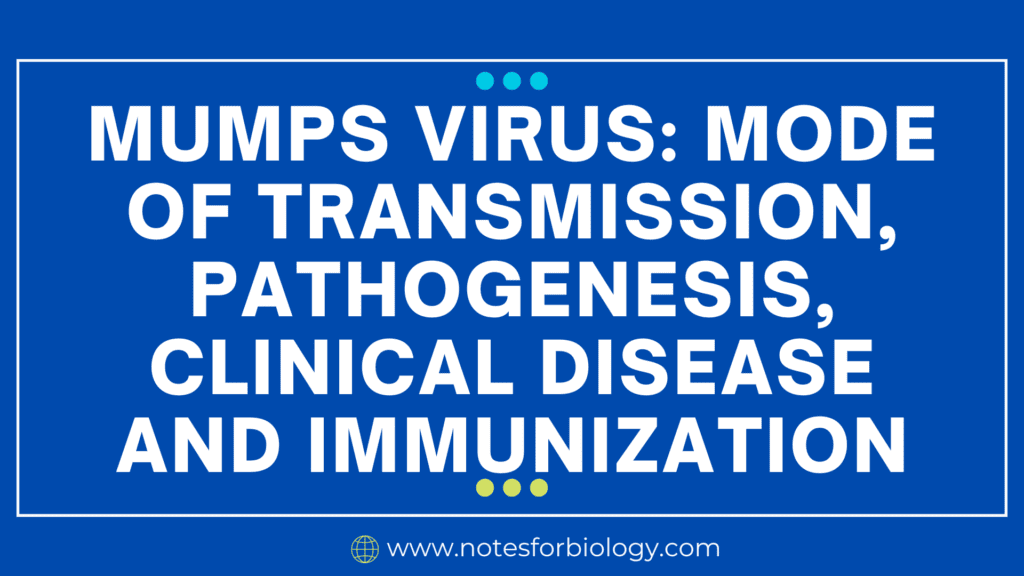Mumps Virus

Mumps, also known as epidemic parotitis, is a contagious viral disease caused by the mumps virus, a member of the paramyxovirus family. Characterized by swelling of the salivary glands, particularly the parotid glands, mumps can cause a variety of complications, including meningitis, encephalitis, and hearing loss. Understanding its transmission, pathogenesis, clinical features, and prevention through immunization is crucial in controlling this disease.
Table of Contents
Mode of Transmission of Mumps Virus
Mumps is primarily transmitted through respiratory droplets produced when an infected person coughs, sneezes, or talks. These droplets can travel up to six feet and infect others who come into contact with them. The virus can also spread through direct contact with saliva, such as sharing utensils or cups.
Incubation Period
The incubation period for mumps virus is typically 12-25 days, meaning it takes this long for symptoms to appear after exposure to the virus. During this period, individuals are contagious and can unknowingly spread the infection.
Pathogenesis
Entry and Replication
The mumps virus enters the body through the respiratory tract, where it infects the epithelial cells. It then replicates in the upper respiratory tract and spreads to the bloodstream.
Spread to Salivary Glands
The mumps virus travels to the salivary glands, particularly the parotid glands, where it replicates further. This leads to inflammation and swelling, causing the characteristic symptom of mumps.
Other Organs
In some cases, the mumps virus can spread beyond the salivary glands to other organs, including the central nervous system (causing meningitis or encephalitis), pancreas (causing pancreatitis), testes (causing orchitis), and ovaries (causing oophoritis).

Clinical Disease
Symptoms
The most common symptom of mumps is unilateral or bilateral swelling of the parotid glands, which typically begins on one side of the face and spreads to the other. Other symptoms may include:
- Fever
- Headache
- Muscle aches
- Fatigue
- Loss of appetite
- Earache
- Difficulty swallowing
- Dry mouth
Complications
While most mumps cases are mild and resolve within a week or two, some individuals may experience complications. The most common complications include:
Meningitis: Inflammation of the membranes surrounding the brain and spinal cord.

Encephalitis: Inflammation of the brain.
Orchitis: Inflammation of one or both testicles, which can lead to sterility in rare cases.
Oophoritis: Inflammation of the ovaries.
Pancreatitis: Inflammation of the pancreas.
Hearing loss: Although rare, mumps can damage the inner ear and cause permanent hearing loss.
Diagnosis
Mumps is typically diagnosed based on its characteristic symptoms and medical history. However, laboratory tests can confirm the diagnosis by detecting the mumps virus in saliva, blood, or cerebrospinal fluid.
Treatment
There is no specific antiviral treatment for mumps. Treatment focuses on managing symptoms and preventing complications. This may include:
Rest
Pain relievers
Anti-inflammatory medications
Fluids to prevent dehydration
Immunization
The most effective way to prevent mumps is through vaccination. The mumps vaccine is part of the MMR (Measles, Mumps, Rubella) vaccine, which is typically given in two doses:
First dose: Recommended at 12-15 months of age
Second dose: Recommended at 4-6 years of age
The MMR vaccine is highly effective in preventing mumps, reducing the risk of infection by over 90%. Vaccination is especially important for children and adults who have not been immunized or who have not completed the recommended two doses.
Conclusion
Mumps is a preventable disease that can cause significant discomfort and even serious complications. Understanding the mode of transmission, pathogenesis, clinical features, and prevention methods is crucial in controlling this infectious disease. The MMR vaccine is a safe and effective tool to protect individuals from mumps and its potential consequences.
Remember, immunization is the key to preventing mumps and keeping our communities safe.
Frequently Asked Questions(FAQ)
What do you mean by Virus?
A virus is a microscopic pathogen that can only reproduce within the living cells of other living things. A capsid, a protein covering, envelops the genetic material (DNA or RNA) that makes up viruses. Because they are unable to reproduce on their own, they are not regarded as living beings.
Define orchitis?
Summary. One or both testicles can become inflamed with orchitis (or-KIE-tis). Orchitis can be brought on by viral or bacterial infections, or it can have no apparent cause. The most common cause of orchitis is a bacterial infection, such as one contracted during intercourse (STI). The mumps virus can occasionally result in orchitis.
Related Articles




